Part One – Poland
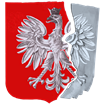
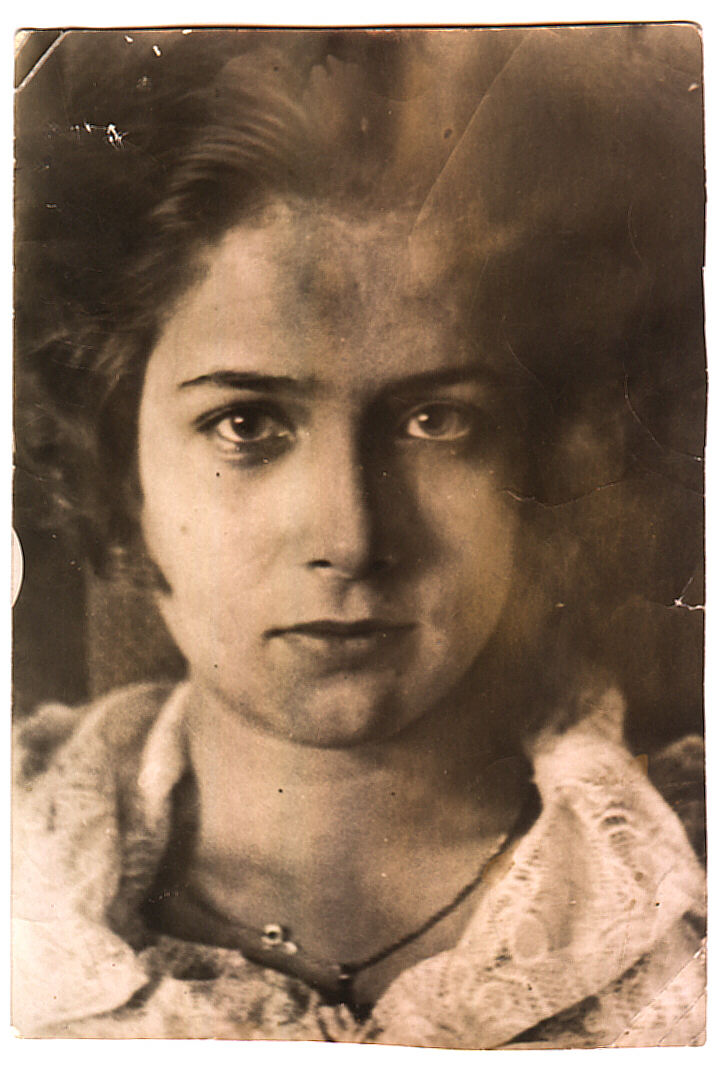
Janina Sulkowska, 1934
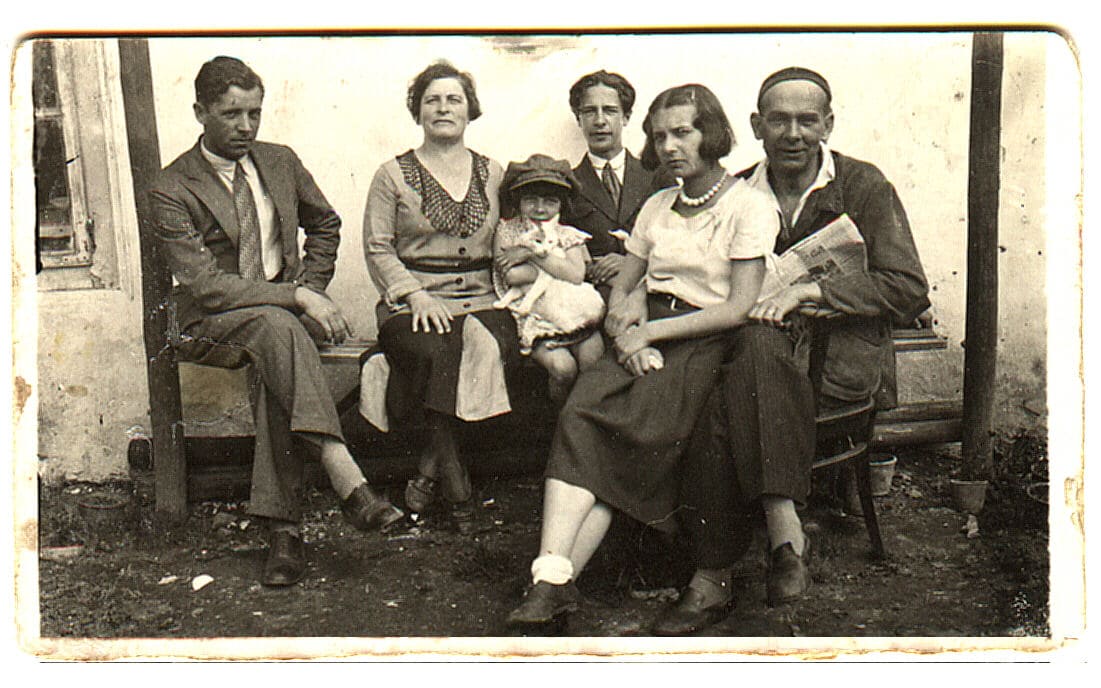
The Sulkowski Family in better times. Janka and her father at front.
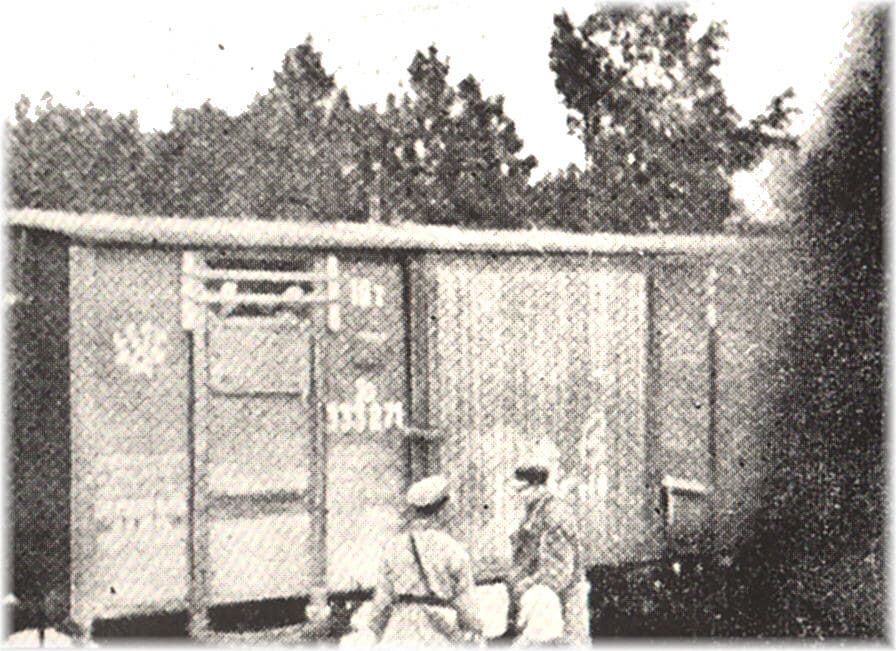
To Siberia: hidden-camera captures Soviets closing a boxcar with prisoners.
My Father’s Arrest
My father was taken away on March 22, 1940. It was Good Friday. For two previous nights the Soviets had conducted raids in Krzemieniec, accompanied by beatings, theft and humiliation. As Poles we were a vulnerable target for the collaborators and blackmailers who took advantage of Soviet tactics in which denunciation was institutionalized, and many friends and neighbors disappeared in this manner. Józek Kagan, our alcoholic Jewish neighbour whose family we often helped, became an NKVD informer and did great wrong to my father.
Yet my father later forgave him and risked his own life by literally picking up the man up from a street in the USSR, and paying for a hospital bed so he could at least die in peace.
Typically the NKVD would give their victims twenty minutes to pack before they were taken away by truck or wagon and loaded into a boxcar bound for Siberia, or to jail for interrogation. Usually the entire household fell victim, from the very young to the very old. Over fifty people were rounded up on this occasion, including leading figures of our local government and the Krzemieniec Lyceum, as well as policemen and soldiers, and several Ukrainian nationalists. Thus Krzemieniec had it’s most influential element stripped away, attesting to the help that the Soviets had from local informers. Similar arrests would claims hundreds of thousands across Soviet-occupied Poland.
My father (suffering an infected ear in addition to his bronchitis) was near the end of his psychological and physical well-being. He had lost his job and had been forced into acting as an interpreter (he knew Russian and Ukrainian) for the Soviets in their dealings with prisoners. He understood it was only his capacity as translator that still allowed him to return home at night instead of sharing a cell. In early October of 1939 I witnessed the arrest of Starost Zaufal, from our house directly across from the County Building in the town centre. The NKVD accompanied by local Ukrainian and Jewish militiamen wearing red arm bands and armed with rifles (one was on horseback) came for him, and for my father as translator. To the accompaniment of jeers they chased the pair down the middle of the road to NKVD headquarters. My father returned a few hours later without his friend.
The night of Good Friday was shattered by the pounding of rifle butts on our door. An NKVD Captain named Truchun and two policemen in civilian clothing burst in. My family was herded into the corner of the main room while they conducted a search for weapons, but none were found. Both my mother and sister were hysterical. Truchun thrust the arrest papers in my father’s direction, who merely nodded and put on his coat. My mother gave him his favorite hat to protect his ear and bald head, and we all tried to give him a hug. And then he was bundled out the door–a frail man in the grasp of guards as if he were some notorious criminal. I didn’t even cry much, knowing that as a proud Pole and an official in the local government, his arrest was inevitable. But little did we imagine that my mother and sister would never see him again. Some ten months later (after terrible interrogations) he would be sentenced by a Soviet court to the labor camps for such crimes as “associating with kulaks” and “speaking of the low quality of products of the USSR.” The case was conducted by the Soviets in Russian based on the laws of the USSR, with local Ukrainians and Jews serving as “witnesses.” My sister spent the rest of the night crying so that by morning she had a fever and spent the next day in bed. On Easter Sunday she went to church to pray for our father, while I accompanied my mother and brother to do our duty as Soviet citizens.
Easter Elections, 1940
That Easter Sunday “elections” were held to choose delegates to the Soviet of the Union and the Soviet of Nationalities, and for the Republican Supreme Soviets. The campaign had been in full swing since January in which the citizenry was encouraged by teenage Jewish thugs, so-called “agitators,” using the same thuggish methods that had convinced us previously to transform Soviet-occupied Poland into “Western Byelorussia” and “Western Ukraine.” Colonel Majewski advised all members of the ZWZ to vote because this was the only way to receive Soviet documentation without which it would be impossible to exist as a citizen. In fact no one really had any choice in the matter as people were even dragged from their beds.
In the electoral office I came face to face with my Ukrainian school chum, Marek Tkazcuk, officiating at the sham proceedings as Director of the Russian School at the Lyceum of which he was a graduate; as a young university student, he was hardly qualified for such a position. I recalled the trouble he had with the Polish police for spreading propaganda, and how we pulled strings to get him out. I shared lodgings with him at Warsaw University where we spent hours discussing politics (he was an internationalist, but his girlfriend was a Ukrainian nationalist.). We had always tended to dismiss him as a hot-head and took what he said with a grain of salt. But now he was denouncing the Lyceum and its teachers, claiming they gave scholarships in order to “buy the souls of the poor Ukrainian peasant.”
Marek coldly read out our names and handed us the open ballots without looking. I stared at him and hoped that he could feel my loathing. Under the stern gaze of officials, the three of us walked over to the ballot box and with barely-concealed disgust, deposited the ballots which contained but a single name. According to Soviet propaganda this process was “based on the most democratic constitution in the World–Stalin’s!” As we left the polling station I cast a final look back at Comrade Marek and found myself agreeing with members of my underground to allow Zygmunt Rumel to execute him as a traitor responsible for numerous arrests and deaths. But little did we suspect that Tkaczuk and his Soviet masters were probably already aware of all our plans and were setting their own agenda for our group.
My Arrest

Truchun immediately announced that I was under arrest. As previously they pushed everybody into one corner of the kitchen under the guard of the soldier. The NKVD officer took my little sister as a witness while they searched my possessions. Truchun grabbed a photo of me at university from my bedside and put it in his briefcase frame and all. They then threw apart my bedroom, scattering personal things, books, luggage, even my bed. I had placed my hollowed-out soap with the secret leaflets near the stove to dry, while a photo of Colonel Majewski sans beard, which my brother, an excellent photographer, was converting into forged ID, had been hidden inside our sofa. But they didn’t even glance at the stove or sofa, and ended up confiscating my personal papers and documents…and a copy of the magazine Mloda Wies [Young Village] with an article about the Polish-Soviet War of 1920 and a photo of “the entrance of Polish and Ukrainian Forces into Kiev.” That magazine article would prove to have serious consequences for me.
Hanging over our sofa was a decorative wine-skin. Old and unused for many years it had caught the eye of the Jew who became obsessed with it. It seems they had heard something rustling inside, and he was trying to extract this “something” through the narrow spout. But the wine-skin would not cooperate and refused to yield its treasure. In exasperation he began to choke it as if it were a goat that had swallowed something valuable! All of us watched in amazement as he carried on the fight with the stubborn wine-skin until Truchun ordered the man to accompany him to get the car. The Soviet soldier was left to watch over the four of us who were still huddled in the corner of kitchen.
Just minutes later, my mother and brother returned from NKVD headquarters where they had delivered the package to my father, but had not been allowed to see him. Stumbling upon this scene of chaos in her own home and learning of my arrest, Natalia Sulkowska flew into a rage and began cursing the Soviet soldier in both Polish and Russian. She had had enough, and her fury exploded. I tried to calm her down with Valerian drops but to no effect. And then a very strange thing happened. The Russian soldier–not much more than a boy–suddenly broke down and tearfully explained that he didn’t want to arrest or hurt civilians. He was just a conscript who had a family just like ours, but had been told by his superiors that he was going to fight a vicious enemy. My mother took pity on him and gave him a slice of cake while I boiled some tea. The young man propped up his rifle in the corner and sat down at our kitchen table wolfing down our decadent snack and thanking us. When Captain Truchun returned to this scene of domestic bliss, his fury now exploded on the poor soldier. He began smacking him in the head, sending the cake flying, while the boy kept saluting and demanding to be sent to the front for his crimes. And my mother insisted that it was all her fault!
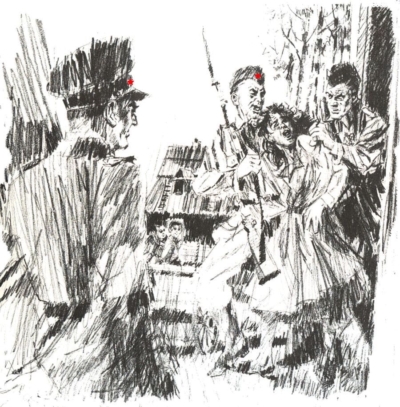 While this strange scene unfolded, I managed to whisper to my sister Wanda to take the soap off the stove and to destroy the secret messages–to my horror I could see that it had split and revealed its contents! I also quickly advised Jurek, who was terrified and hadn’t said a word, that he should quickly make his way to No. 4 Zabramie Street in Dubno to warn the Trautmans and inform the group of my arrest. But what a naive fool I was! Little did I suspect that they had already all been swept up in the nets of the NKVD, on information supplied by a traitor or extracted from a prisoner–and that I was actually sending Jurek into a trap! Finally I begged the Captain to let me change into warmer clothing and was allowed to don ski pants, a warm sweater and extra socks. While the attention shifted to the other room, Czeslaw took the soap off the stove and quickly threw the leaflets into the stove–and adroitly extracted that incriminating “something” from the wine skin with a darning needle, which in fact was a letter from the Colonel!
While this strange scene unfolded, I managed to whisper to my sister Wanda to take the soap off the stove and to destroy the secret messages–to my horror I could see that it had split and revealed its contents! I also quickly advised Jurek, who was terrified and hadn’t said a word, that he should quickly make his way to No. 4 Zabramie Street in Dubno to warn the Trautmans and inform the group of my arrest. But what a naive fool I was! Little did I suspect that they had already all been swept up in the nets of the NKVD, on information supplied by a traitor or extracted from a prisoner–and that I was actually sending Jurek into a trap! Finally I begged the Captain to let me change into warmer clothing and was allowed to don ski pants, a warm sweater and extra socks. While the attention shifted to the other room, Czeslaw took the soap off the stove and quickly threw the leaflets into the stove–and adroitly extracted that incriminating “something” from the wine skin with a darning needle, which in fact was a letter from the Colonel!
A car was waiting at our gate. The last memory I have of my home life is of my tearful mother outlined in our doorway with her hands at her heart, my brother at her side, and my little sister crying from the window, holding her beloved cat Zbik [Wildcat]. And so I said good bye to my family for many years and to my beloved Krzemieniec forever. I have now lived for twice as long outside Poland as in it…but how the memory of Krzemieniec lingers!
Christopher Jacek Gladun was born in 1951 and grew up in Canada to where his family emigrated from England as displaced persons. Sadly, Chris died in Toronto in March 2003. He held a diploma in Journalism from the Niagara College and a BA in Polish Language & Literature from the University of Toronto. Chris also acted as interviewer and researcher for the documentary film “Rescued From Death in Siberia”.
This content is now maintained by the Kresy-Siberia Group, which Chris was a charter member of and which is taking his website and his research work forward.